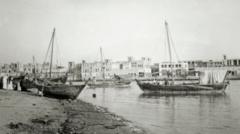Could Dubai Have Been Part of India?

Unraveling the Historical Ties Between the Arabian Peninsula and British India
The intricate relationship between the Arabian Peninsula and British India is a captivating chapter in colonial history that often goes unnoticed. In the winter of 1956, the observations of The Times correspondent David Holden shed light on this interconnected past, revealing a complex tapestry of political, cultural, and social threads that linked these regions. From the remnants of British administrative practices to the echoes of Indian influence lingering in Arabian states, the historical narrative is rich and multifaceted. This article delves into this fascinating history, exploring the implications of British colonial rule in the Gulf and its lasting impact on the region's identity.
The British Protectorate: A Glimpse into the Past
Holden's arrival in Bahrain marked a period when the island was still under British protectorate status, providing a unique vantage point to observe the remnants of British India. The term "Raj" refers to the British rule in India, and as Holden noted, it maintained a peculiar presence in the Gulf region. The societal structures, language, and even culinary practices reflected an enduring connection to the Indian subcontinent.
The Cultural Footprints of the Raj
In places like Dubai, Abu Dhabi, and Oman, traces of British India were ubiquitous. The presence of Indian terms such as "bearers," "dhobi," and "chowkidar" served to reinforce the lasting impact of colonial rule. The Sultan of Oman, educated in Rajasthan, spoke Urdu more fluently than Arabic, illustrating the deep cultural exchanges that occurred. The soldiers in Qu'aiti donned uniforms from the now-defunct Hyderabad army, further highlighting the anachronistic remnants of the colonial past.
Political Anomalies and Administrative Complexities
Despite the geographical proximity and cultural intermingling, many in the British and Indian public were largely unaware of the Arabian territories' connection to the British Raj. The legalities surrounding these protectorates were complex. Under the Interpretation Act of 1889, regions like Bahrain, Kuwait, and others were considered part of British India. The Indian Political Service governed these territories, and Indian troops policed them, indicating a deeper integration into the imperial structure.
The Shift in Political Landscape: From Empire to Independence
As the 20th century progressed, Indian nationalists began to envision India as a cultural entity separate from the imperial framework. This shift in perspective coincided with political changes in the Gulf region. The partition of British India was not just a division of land; it also led to a reevaluation of the British Empire's influence in surrounding territories.
The Partition and Its Aftermath
On April 1, 1937, the British government made a significant decision by separating Aden from British India. This move was marked by a telegram from King George VI, signaling the end of Aden's almost century-long association with the Indian Empire. Despite this severance, the Gulf states remained under the purview of the Government of India for another decade, ensuring that the British influence persisted in the region.
The Gulf's Separation from India
As India moved towards independence in 1947, discussions arose about the future of the Gulf states. Some British officials expressed surprise at the indifference of Indian and Pakistani authorities towards the Gulf, believing it would be inappropriate to hand over responsibilities to them. Consequently, on April 1, 1947, the Gulf states were officially separated from India, just months before the subcontinent itself was divided.
The Last Vestiges of Colonial Influence
Even after the official separation, British presence in the Gulf persisted. British Prime Minister Clement Attlee's proposal for a withdrawal from Arabian territories was met with resistance, leading to continued British governance in the region for another 24 years. This era is often referred to as the "Arabian Raj," characterized by British officials operating under a framework that still bore the hallmarks of the Indian Empire.
The End of an Era: British Withdrawal
In 1971, the British finally withdrew from the Gulf, ending a colonial chapter that had lasted for over a century. David Holden's observations echoed the sentiments of many, as he noted that the Gulf states were now free to seek their own path without British intervention. This marked a significant turning point, not just for the Gulf but also for the legacy of British colonialism in the region.
Revisiting Historical Narratives
The narrative surrounding the Gulf states' colonial past has evolved significantly since independence. While there remains a collective memory of British influence, the governance from Delhi is often overshadowed by a constructed myth of ancient sovereignty. This narrative serves to uphold the legitimacy of monarchies in the region, emphasizing a history that aligns with contemporary governance.
Class Dynamics and Cultural Memory
The transformation in societal structures is a poignant reminder of the class dynamics that once existed. Anecdotes, such as that of a Qatari gentleman recalling the privileges of Indian employees during colonial rule, highlight the drastic shifts in power and privilege. Today, the Gulf states, particularly cities like Dubai, have emerged as centers of wealth and modernity, but the historical context remains a vital part of their identity.
The Contemporary Gulf: A Legacy of the Past
Modern-day Gulf cities, especially Dubai, represent a striking contrast to their historical roles as minor outposts of the Indian Empire. The current influx of Indian and Pakistani expatriates, who work across various sectors, underscores the complex interplay of history and modernity. However, most residents remain unaware of the potential alternative histories that could have unfolded had the Gulf states been integrated into India or Pakistan.
Conclusion: Reflecting on Historical Connections
The historical ties between the Arabian Peninsula and British India are a compelling reminder of how colonial legacies shape contemporary identities. The administrative decisions made during the twilight of the British Empire have had lasting ramifications, influencing national narratives and societal dynamics in the Gulf. As we reflect on this intricate history, it is essential to recognize the echoes of the past that continue to resonate in the present. Understanding these connections can foster a deeper appreciation of the complexities involved in national identity and governance in the Gulf region.
FAQs
What was the significance of the British Raj in the Arabian Peninsula?
The British Raj significantly influenced the political, cultural, and social structures in the Arabian Peninsula, with many regions being governed as part of British India until the mid-20th century.
How did the separation of the Gulf states from India impact their modern identity?
The separation allowed Gulf states to cultivate a narrative of ancient sovereignty, distancing themselves from colonial legacies while embracing modern governance and economic development.
What role did Indian nationals play in the Gulf during the colonial period?
Indian nationals were often employed in various capacities, from civil service roles to labor, creating a unique class dynamic that shaped the region’s socio-economic landscape.
As we delve into the historical nuances of the Arabian Peninsula's relationship with British India, one can't help but ponder: how might the narrative of the Gulf states have changed had they been integrated into post-independence India or Pakistan? #GulfHistory #ColonialLegacy #BritishIndia
Published: 2025-06-22 19:00:32 | Category: world



